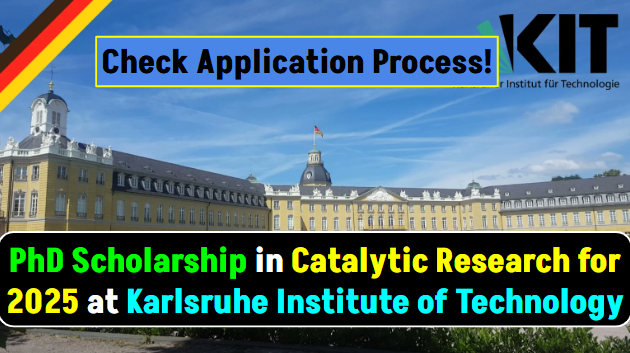
Water contamination is one of the biggest environmental challenges of our time. Researchers worldwide are working on innovative solutions to make water cleaner and safer. If you have a passion for environmental science and want to contribute to cutting-edge research, Karlsruhe Institute of Technology (KIT) is offering fully funded PhD scholarships in catalytic research for 2025. This program focuses on photocatalytic membranes for contaminant removal, aiming to revolutionize water purification technologies.
This article will provide a detailed breakdown of the application process, eligibility criteria, benefits, and research focus of this exciting PhD opportunity at KIT.
PhD Scholarship in Catalytic Research for 2025
| Feature | Details |
|---|---|
| Institution | Karlsruhe Institute of Technology (KIT), Germany |
| Program | PhD in Photocatalytic Membranes for Contaminant Removal |
| Funding | Fully funded (tuition + stipend) |
| Research Areas | Photocatalysis, Membrane Technology, Environmental Engineering |
| Eligibility | Master’s in Chemical/Process/Environmental Engineering or related fields |
| Application Deadline | Varies – check official DAAD listing |
| Contact | Prof. Dr.-Ing. Andrea I. Schäfer (Andrea.Iris.Schaefer@kit.edu) |
A fully funded PhD at KIT in catalytic membrane research is an incredible opportunity for aspiring environmental engineers. This program combines cutting-edge research, practical applications, and career advancement in one of the world’s leading research institutions. If you are passionate about solving water contamination issues, this is your chance to make a real impact. Don’t miss out—apply today!
Also Check: What Are the Rules? A Breakdown of Texas’ Hands-Free Law
PhD Scholarship in Catalytic Research for 2025: Why Choose This PhD Program?
KIT is one of Germany’s most prestigious technical universities, known for its strong focus on research and innovation. This PhD position is particularly exciting because it:
- Tackles a real-world environmental challenge.
- Provides fully funded support, including tuition and a living stipend.
- Offers access to state-of-the-art research facilities through the KIT-Helmholtz Association.
- Allows collaboration with leading scientists like Prof. Dr.-Ing. Andrea I. Schäfer.
- Opens doors to global research and professional networking opportunities.
PhD Scholarship in Catalytic Research for 2025 Focus: Developing Next-Generation Water Purification Membranes
This PhD project is part of KIT’s larger effort to develop advanced photocatalytic membranes for removing contaminants from water. The research includes:
Photocatalyst Selection
Finding the best materials for breaking down pollutants using light. Traditional catalysts like titanium dioxide (TiO₂) are effective but have limitations. The goal is to identify more efficient and sustainable alternatives.
Catalyst Deposition on Membranes
Membranes need special coatings to function efficiently. This research explores innovative ways to deposit photocatalysts on membrane surfaces without affecting permeability.
System Design for Real-World Applications
Most water treatment research stays in the lab. This project aims to bridge the gap between laboratory-scale prototypes and real-world applications, making these technologies viable for commercial use.
Micropollutant Removal
From pesticides to pharmaceuticals, today’s water sources are full of tiny but harmful pollutants. This project develops tailored solutions to ensure complete degradation and environmental safety.
Modeling and Quantification
Using advanced computational modeling, researchers will analyze how pollutants interact with membranes, helping to optimize membrane design.
Also Check: Maximize Your Savings: 2025’s Top 10 Income Tax Credits and Deductions
PhD Scholarship in Catalytic Research for 2025 Eligibility Criteria: Who Can Apply?
To be considered for this PhD scholarship, you must meet the following requirements:
- Academic Background: A Master’s degree in Chemical Engineering, Process Engineering, Environmental Engineering, or a closely related field.
- Research Experience: Experience with membrane technology, catalysis, or environmental systems is preferred.
- Skills: Strong experimental problem-solving and analytical abilities.
- Language Proficiency: Excellent English skills (written & spoken). Knowledge of German is beneficial but not mandatory.
- Other Requirements: A valid driver’s license may be required for project-related travel.
PhD Scholarship in Catalytic Research for 2025: Step-by-Step Guide to Applying
Applying for this PhD position is straightforward. Follow these steps:
Prepare Your Application Documents
You’ll need to submit the following:
- Motivation Letter – A one-page statement explaining why you’re interested in this research.
- Curriculum Vitae (CV) – A detailed resume showcasing your academic and research experience.
- Academic Transcripts and Certificates – Copies of your Master’s degree certificates.
- List of Publications – If you’ve published research, include a list of papers and contributions.
- References – Contact details of three professional referees.
- Preliminary Research Proposal – A brief proposal outlining your research interests and methodology.
Submit Your Application
Send your application via email to Prof. Dr.-Ing. Andrea I. Schäfer at: Andrea.Iris.Schaefer@kit.edu
Interview Process
Shortlisted candidates will be invited for an interview, which may be conducted online or in person.
Final Selection: Successful candidates will receive official admission and funding confirmation.
Also Check: Avoid Long Waits: Use IRS Online Tools for Immediate Support
PhD Scholarship in Catalytic Research for 2025: Benefits of This PhD Scholarship
Fully Funded Opportunity
The PhD position covers tuition and provides a stipend, so you can focus entirely on research.
Access to World-Class Research Facilities
KIT offers state-of-the-art laboratories and research centers under the Helmholtz Association.
Global Networking & Career Advancement
Work alongside internationally recognized experts, participate in conferences, and publish your research in top journals.
Real-World Impact
Your research will contribute to practical solutions for water purification, addressing a global environmental crisis.
Collaboration with Top Scientists
Work closely with Prof. Dr.-Ing. Andrea I. Schäfer and Prof. Dr. Bryce Richards, two leading experts in membrane and catalysis research.
PhD Scholarship in Catalytic Research for 2025 (FAQs)
What is photocatalysis, and why is it important for water treatment?
Photocatalysis uses light-activated materials to break down pollutants. It’s an energy-efficient and eco-friendly method for cleaning water.
Do I need to speak German to apply?
No. English proficiency is sufficient, though German skills can be helpful.
Is there an age limit for applicants?
No, there’s no age restriction, but applicants must have a Master’s degree.
How long does the PhD take?
The typical duration is 3-4 years, depending on research progress.
When is the application deadline?
Check the official DAAD listing for deadline details:
DAAD Official Website









